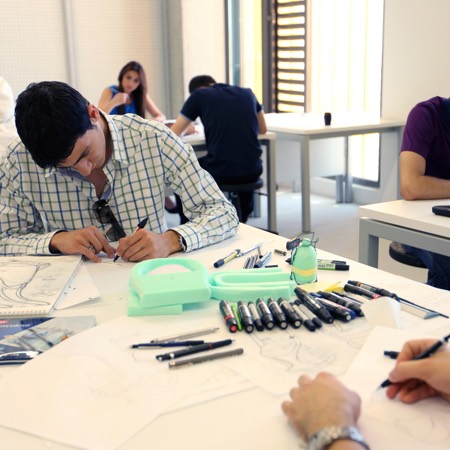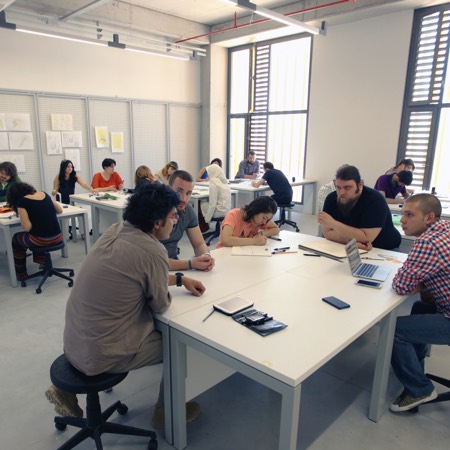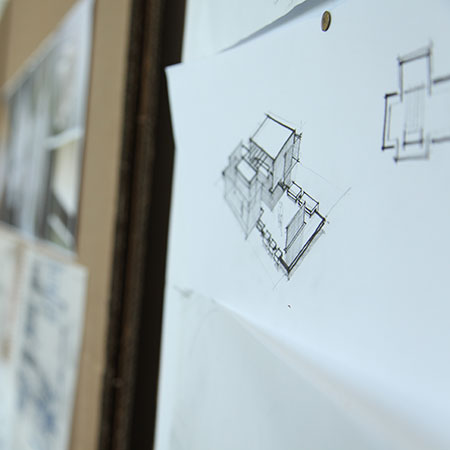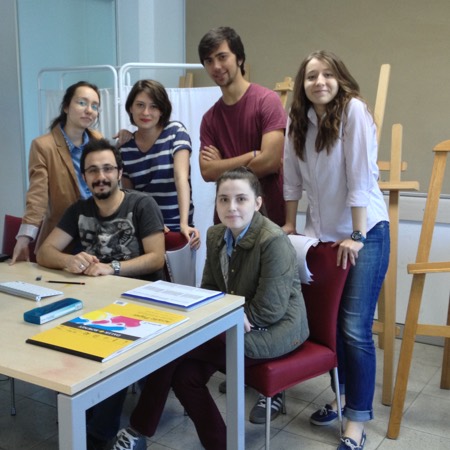| Course Code | Course Title | Prerequisite | Credits |
| EÜT 101 | Introduction to Industrial Design | - | 2 |
| Within the context of this course, students are introduced with design definitions, notions and the terminology and encouraged to discuss these throughout the course. They are also expected to interpret the design-related films that are watched during the class. Additionally, by giving some quick design problems to solve, it is aimed that students gain the necessary habits such as working under time pressure. | |||
| EÜT 105 | Product Visualisation | - | 3 |
| Introducing basic sketching techniques and developing quick sketching skills which are necessary for the design process. | |||
| EÜT 106 | Product Visualisation II | EÜT 105 | 3 |
| Development of students' quick sketching and presentation skills that are necessary for the product design process. The course also includes the topics; coloring, presentation board layout and presentation. | |||
| EÜT 109 | Technical Drawing | - | 3 |
| This course includes the topics that constitute a basis for the technical drawing applications for design and manufacturing. The main objective of the course is to help students comprehend two-dimensional drawings as 3D objects and develop their technical drawing skills for production. | |||
| EÜT 110 | Structural Design | - | 2 |
| This course includes the topics that are related to the basics of structural design for the industrial design practice. It provides knowledge on the basics of physics, statics, dynamics and optics thus constitutes a scientific basis that is required at every stage of the design process. | |||
| EÜT 121 | Basic Design I | - | 6 |
| This course aims to explain the basic design principles to students while helping them to gain skills on the topics such as basic design concepts, visual thinking, transferring ideas to two-dimension, organization, composition, abstraction. Students are encouraged to think outside the box when seeking solutions to simple design problems for the given tasks. The course is supported with extracurricular activities to develop students' awareness on 'design in quotidian'. | |||
| EÜT 122 | Basic Design II | EÜT 121 | 6 |
| In this course, basic design concepts and principles that are previously studied in the context of EUT 121 Basic Design I course are transferred to three dimensions with in-depth exercises. Additionally, with these exercises, students develop their hand skills by working with different materials. | |||
| EÜT 203 | Model Making | - | 2 |
| The course is comprised of the basic model making techniques for the industrial design process. | |||
| EÜT 211 | Ergonomics in Product Design | - | 3 |
| In this course, students are expected to know the use of ergonomics principles in industrial design and product-user relationship. | |||
| EÜT 215 | Computer Aided Presentation Techniques | - | 3 |
| Explaining the essential techniques that are required for the presentation of their designs and the preparation of presentation boards for their designs. | |||
| EÜT 216A | Computer Aided Product Design I | - | 3 |
| The course covers the topics that provide a basis for computer-aided design applications. The main subject of the course is to visualize and present design ideas with three dimensional CAD software. The course also includes the basic working principle of 3D modeling sofware and their contribution to design discipline and designers. | |||
| EÜT 218 | Industrial Design History I | - | 2 |
| This course examines the historical process of the notion of modern design in terms of economic, technologic and social developments and changes. The main objective of the course is to understand the social and economic development of art a craft-based means of production along with its aesthetic and theoric meanings while also investigating how the changes that were led by the industrial revolution, particularly in the 19th century, transformed the modes of production and quotidian practices from an anthological perspective. | |||
| EÜT 221A | Industrial Design Studio I | EÜT 122 | 6 |
| In the context of Industrial Design Studio I, students are introduced with the industrial design processes. In this sense, students begin to develop product design solutions by defining certain problems and user groups in line with the given briefs. | |||
| EÜT 222A | Industrial Design Studio II | EÜT 221A | 6 |
| In the context of Industrial Design Studio II, students develop projects by using their insights regarding the industrial design processes that they are introduced throughout the previous course (EUT 221A Industrial Design Studio I). Students develop their design projects through defining problems and considering specific user groups. | |||
| EÜT 249 | Materials and Manufacturing I | - | 3 |
| This course focuses on the importance of material selection for industrial design, identification of material behaviors, frequently used materials in the industry, their application areas along with the manufacturing methods of the mentioned materials. | |||
| EÜT 250 | Materials and Manufacturing II | EÜT 249 | 3 |
| This course focuses on the importance of material selection for industrial design, identification of material behaviors, frequently used materials in the industry, their application areas along with the manufacturing methods of the mentioned materials. | |||
| EÜT 317A | Computer Aided Product Design II | - | 3 |
| This course includes the topics that would provide a basis for computer-aided design, visualization and animation applications that are required for industrial design discipline. The main topics which the course focuses on are the modeling, presentation and visualization of design ideas via computer-aided design software. The basics principles of 3D modeling softwares and their contribution to both designers and industrial design discipline. | |||
| EÜT 318A | Computer Aided Product Design III | - | 3 |
| This course includes the topics that would provide a basis for computer aided design and manufacturing software that is required for industrial design discipline. The main topics which the course focuses on are the modeling, analysis and preparation of design ideas for manufacturing via computer-aided design software. The basics principles of 3D modeling software and their contribution to both designers and industrial design discipline. | |||
| EÜT 319 | History of Industrial Design II | EÜT 218 | 2 |
| This course aims to examine the periodic developments that constitute the basic building blocks of modern design philosophy as of the beginning of the 20th century through product, daily life practices, and industrial designer identities. | |||
| EÜT 321A | Industrial Design Studio III | EÜT 222A | 6 |
| The themes such as style, aesthetics, mechanism and materials are applied in industrial design processes through exemplary products. The main topics that are included in the course are design concept development, visualization of these, their analysis and critique. Students are expected to define design problems based on the preferences and needs of users and to develop design solutions as a response to these problems in functionally and visually coherent way. | |||
| EÜT 322A | Industrial Design Studio IV | EÜT 321A | 6 |
| The themes such as style, aesthetics, mechanism and materials are applied in industrial design processes through exemplary products. The main topics that are included in the course are design concept development, visualization of these, their analysis and critique. Students are expected to define design problems based on the preferences and needs of users and to develop design solutions as a response to these problems in functionally and visually coherent way. | |||
| EÜT 330 | Marketing | - | 2 |
| This course aims to provide students with the knowledge and skills to use scientific research methods which are essential for industrial design profession , basic concepts of marketing, basic principles of marketing process, market research, consumer behavior, brand creation and brand promotion, marketing communication and digital marketing; product design, management and development processes. | |||
| EÜT 331 | User Research in Product Design | - | 3 |
| Describing the basic approaches in user research, demonstrating the techniques applied in professional life through examples with basic approaches, applications of research projects that should be prepared according to the characteristics of the users and considering the requirements of the design project. | |||
| EÜT 405 | Computer Aided Production | - | 3 |
| The course covers topics that will constitute a basis for modeling applications for computer-aided design and production, which are essential for industrial design discipline. The basic concept of the course is to express, analyze and prepare the design ideas that are developed in a three-dimensional computer environment. The course covers the basic functioning and contribution of 3D solid modeling programs to physical production. | |||
| EÜT 408 | Professional Practice | - | 1 |
| The course includes practical information on the discipline of industrial design, legal, financial and managerial information such as establishing a company, managing an organization, and relations with users. The course hosts industry practitioners and progresses through the presentations and discussions. Patent, design registration, utility model, brand concepts, national and international legal regulations related to the subject, contract preparation, design summary preparation and oral presentation techniques are also covered in the scope of the course. | |||
| EÜT 421 | Industrial Design Studio V | EÜT 322A | 6 |
| Creative thinking techniques and design methods are applied in the example projects and complemented by other components of the design. The design process is based on a pre-defined timeline, through which process ideas are developed, evaluated, transformed into design problems, alternatives are developed and evaluated according to objective criteria. Through the project development process, students should define design problems per user needs and expectations, and the solutions they offer to these problems are expected to include conceptual diversity, detailing, along with functional and visual integrity. Students are expected to set up their time schedules and complete the project within this schedule. | |||
| EÜT 421 | Industrial Design Studio VI (Graduation Project) | EÜT 421 | 6 |
| In the last project course of the vocational education process, students are expected to make projects with professional partners. Together with the product expected to emerge from the Academy-Industry collaboration, students are expected to handle all the inputs of the product design process professionally. In this process, students are expected to gain joint product development experience with the industry and reflect on their experience in project and innovation management. | |||
| EÜT 451 | Portfolio and Presentation Techniques | - | 2 |
| This course covers the topics that would help students to establish their own visual identity and approaches while also designing effective portfolios that they require for their career. | |||
| Departmental Elective Courses | |||
| EÜT 209 | Universal Design | - | 3 |
| It relates to the properties of the spaces and products to be designed for everyone, including the disabled, and to the project work on these spaces. User characteristics shall be defined and applications shall be made in the determined products per the requirements. | |||
| EÜT 224 | Clay Modelling | Önkoşul: - | 3 |
| Introduction to plastic modeling materials. Basic shaping techniques and modeling of 3D forms with clay material. Design and prototyping based on the features of materials and their production methods. | |||
| EÜT 315 | Modular Design | - | 3 |
| The course aims to inform students on the concept of modular design that is based on units creating a structure through various exercises. | |||
| EÜT 316 | Sustainable Design | - | 3 |
| Being related to the design approach that is new yet have a significant place, this course aims to provide students with information about sustainable design and to carry out studies in this direction. | |||
| EÜT 323 | Product Semantics | - | 3 |
| This course aims to examine the communication process between the product and the user and to enable students to reflect this relationship to the design process. In this context, basic communication theories and their usage areas are explained to the students. At the end of the course, it is aimed that the students have adopted these theories and developed the ability to transfer the theories used in different industries to the design processes. | |||
| EÜT 333 | Consumer Behaviours | - | 3 |
| The investigation of the secret heroes of the new product development process that include the consumers' behaviors; the examination of the psychological, sociological and economic factors that guide these behaviors, the definition of behavior patterns and their contributions to the stakeholders (designers, producers, marketers) various readings, observations, case studies and experiences. | |||
| EÜT 340 | Animation Applications | - | 3 |
| EÜT 351 | Gender Studies in Design | - | 3 |
| EÜT 371 | Urban Culture | - | 3 |
| EÜT 375 | New Movements in Design | - | 3 |
| EÜT 392 | Creativity in Design | - | 3 |
| EÜT 398 | Assistive Technologies | - | 3 |
| EÜT 400 | Design Management | - | 3 |
| In this course, students will examine the concept of design management, its process and history, the relationship of business functions with design, conceptual dimension and development of design management, relationship between business philosophy and design concept, design management's organizational behavior, consumer behavior-culture- , marketing, production, finance, strategy and business model concepts are the subjects of this course. | |||
| EÜT 401 | Stage Design | - | 3 |
| In this course, stage design, which has different design criteria than other places, will be given information about the features appropriate to the communication style required. Students are expected to study on the formation of scripts and theme creation for television and theater scenes. | |||
| EÜT 403 | Design Competition Project | - | 3 |
| The course covers the process of participating in existing industrial design competitions. | |||
| EÜT 418 | Packaging Design | - | 3 |
| The course is an introductory course to the packaging design process that aims to introduce students the principles and applications of packaging design in the field of industrial product design. | |||
| EÜT 423 | Jewellery Design | - | 3 |
| In this course, jewelry design will be studied. Throughout the course, theoretical and practical studies on aesthetic, ergonomic and functional properties of jewelry design shall be carried out. | |||
| EÜT 425 | Design Methods | - | 3 |
| This theoretical course aims to examine the design methods developed by designers and academics, their impacts on the industry and their application areas. | |||
| EÜT 426 | Advanced Computer Techniques | ||
| EÜT 427 | Smart Products | - | 3 |
| The course will examine the technologies that are expected to exist in the future and trends that will affect the development of these technologies. Besides, design problems will be created through future user needs, materials and living styles and conceptual design solutions will be proposed to such problems. | |||
| EÜT 429 | Design Theory | - | 3 |
| The course covers design methods for design disciplines comparatively. While design methods are described within the design process, Derste blends them with experience in the industry, visits to factories, visitor talk and case studies, and aims to be a guide for the designer to develop his original method. | |||
| EÜT 431 | Vehicle Design | - | 3 |
| EÜT 435 | Experience Design | - | 3 |
| The course covers the basic topics of human-computer interaction and interface, usability, and interaction with smart products. | |||
| EÜT 437 | Urban Furniture Design | - | 3 |
| In this course, the included topics are as follows; the basic elements that constitute the space, elements increasing and diversifying the use of space and the utilization of surroundings, adding value to the places where it is used with functional and aesthetic properties, design criteria related to color, form, norm, measurement material and its connections and spatial, manufacture and usage area considering their different aspects in terms of transportation and accessibility, concepts for users with physical disabilities. | |||
| EÜT 441 | Drawing for Transportation Design | ||
| The course covers the visualization of transportation vehicles by using various tools and techniques to increase the design and drawing skills of industrial design students and to improve their knowledge and skills in the design of transportation vehicles. | |||
| Faculty Elective Courses | |||
| SAT 107 | Art History I | - | 3 |
| SAT 108 | Art History II | SAT 107 | 3 |
| SAT 111 | Art Sociology | - | 3 |
| SAT 112 | Art Philosophy | - | 3 |
| SAT 116 | Museum Education and Design Museums | - | 3 |
| SAT 203 | Communication, Culture and Technology | - | 3 |
| SAT 205 | Photography I | - | 3 |
| SAT 206 | Photography II | SAT 205 | 3 |
| SAT 209 | Writing and Communication Skills | - | 3 |
| SAT 211 | Aesthetics | - | 3 |
| SAT 213 | Mythology | - | 3 |
| SAT 215 | Turkish and Islamic Arts | - | 3 |
| SAT 219 | Communication Sociology | - | 3 |
| SAT 220 | Design and Communication | - | 3 |
| SAT 222 | Art and Design in the Twenty First Century | - | 3 |
| SAT 224 | Art and Design in Turkey | - | 3 |
| SAT 226 | Art and Design Critiques | - | 3 |
| SAT 228 | Social Psychology | - | 3 |
| SAT 230 | History of Culture | - | 3 |
| SAT 301 | Free Research Course | - | 3 |
| SAT 302 | Drawing | - | 3 |
| SAT 303 | Choir | - | 3 |





